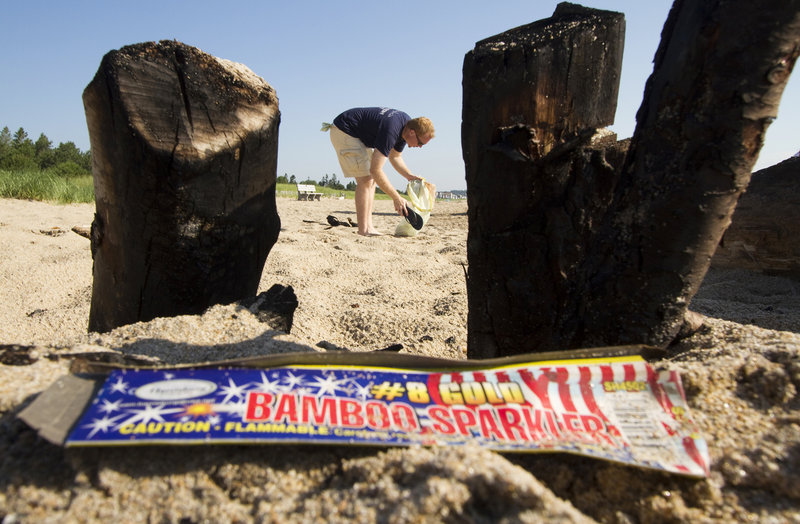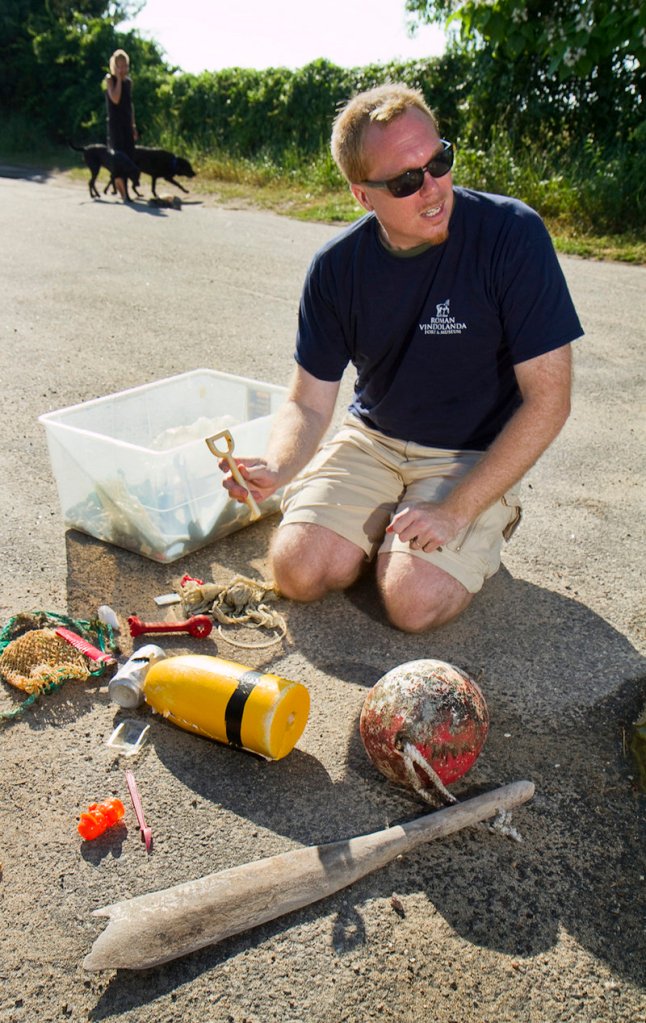A battered buoy, a menu from a Bar Harbor restaurant, a lobster claw band, and even a piece of a blue plastic recycling tub from New Brunswick drifted to Bay View Beach in Saco last year.
That’s where they were scooped up by Harold Johnson — beachcomber, debris documenter and creator of an unusual blog known as the Flotsam Diaries.
“I’m trying to motivate people to see what’s going on in the ocean,” said Johnson, a freelance copy editor from Saco. “You don’t need a degree to pick up trash and learn from it.”
Since March 2010, Johnson has spent about 12 hours a week picking up, documenting, categorizing and charting 8,456 pieces of debris. In the process, he has accumulated 52 blog followers, 318 likes on Facebook, and 371 Twitter followers.
Johnson isn’t alone in his hyper-local effort to document and clean up the beach, according to Patty Debenham of the Ocean Conservancy, an organization based in Washington, D.C.
“We have the best dataset in the world, and that’s because of citizen science that comes from people like Harold,” she said. “They move the research in a rigorous way.”
The conservancy is an international nonprofit organization that works to protect the ocean.
Debenham, who directs the Trash Free Sea program, said the conservancy is working to unite scientists with the hundreds of people worldwide who document beach debris.
“I’m positive these citizen scientists and their data will have a large impact,” she said.
On Thursday morning, Johnson hit the beach at 7:30 with sunglasses on his nose and a trash bag in hand. He paced the 250 feet of shore, one of two patches he documents, picking up remnants of Fourth of July celebrations and washed-up bits of plastic.
“I pretty much like anything that makes me ask questions,” he said. “That’s what keeps me coming back each week — the chance to find a new story to tell, and some answers about where the trash is coming from.”
He said he vividly remembers going to the beach as a child with his mother, sticking his toes in the sand and listening to the sound of the ocean.
“When I took my daughter to the beach, I thought, ‘Is this the world we’re bequeathing to her?’ and I decided to do something about it,” he said.
Twenty-five years of citizen documentation from the conservancy’s international annual Coastal Cleanup Week has already convinced many companies to re-evaluate and change the way they package food, Debenham said.
Last year, 150 countries participated in the 25th weeklong cleanup and data collection.
In Maine, 38,000 people were involved in the effort, scouring 60 beaches for trash last year, said Lorraine Lessard of the State Planning Office’s Maine Coastal Program.
This year, the cleanup will take place Sept. 17-24.
The conservancy’s 2010 report lists 10 major global ocean debris items: cigarettes; food wrappers and containers; caps and lids; cups, plates, knives and spoons; beverage bottles; plastic bags; glass bottles; cans; straws, and rope.
Johnson said the list reflects his own tally of trash he finds on Bay View Beach.
The common denominator among most items on the lists — plastic.
In 2010, 80 percent of the trash Johnson collected was plastic.
“Plastic is so cheap,” he said, holding up a plastic shovel handle, smoothed by the sea. “It’s the double-edged sword of convenience. You toss it without thinking, and it lasts 10 lifetimes.”
Johnson, who picked up trash on the beach 43 out of 52 weeks last year, said he tries not to get overwhelmed by garbage strewn just feet away from trash cans, and the constant flotsam from the sea.
He said he finds a source of resilience in the network of people around the world working for the same cause.
An hour and a half after he began picking up trash Thursday, he spread the items out for counting: 229 pieces of litter overall, including 27 pieces of plastic foam, 18 fishing-related pieces of debris, 32 food-related plastics and 55 cigarettes.
“The trash is awful, but it’s there,” he said. “It would be worse if we didn’t try to learn from it.”
Staff Writer Colleen Stewart can be contacted at 791-6355 or at:
cstewart@pressherald.com
Send questions/comments to the editors.




Comments are no longer available on this story